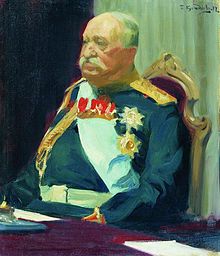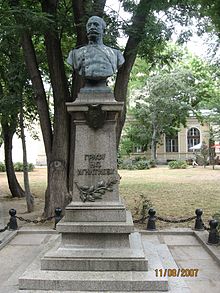- Nikolay Pavlovich Ignatyev
-
Count Nikolay Pavlovich Ignatyev (historical spelling Nicolai Ignatieff; Russian: Никола́й Па́влович Игна́тьев; 17 January Old Style (29 January on Western calendar) 1832 – 20 June Old Style (3 July on Western calendar) 1908) was a Russian statesman and diplomat. During his career he was sometimes at odds with another Corps of Pages alumnus, Count Pyotr Shuvalov.
Contents
Early life
Nikolay Ignatyev was born in St Petersburg to Maria Ivanovna Maltsova and Captain Pavel Nikolayevich Ignatyev. His father had been taken into favour by Tsar Nicholas I, owing to his fidelity on the occasion of the Decembrist revolt in 1825, and Grand Duke Alexander (later Tsar Alexander II) stood sponsor at the boy's baptism. After graduating from the Corps of Pages, at the age of seventeen he became an officer of the Russian Guards. He was appointed military attaché in London in charge of intelligence but was expelled by Britain after a failed operation.
Diplomatic career and involvement in the Great Game
Ignatyev's diplomatic career began at the Congress of Paris in 1856, after the Crimean War, where he took an active part as military attaché in the negotiations regarding the demarcation of the Russo-Ottoman frontier on the lower Danube.
Two years later he was sent with a small escort on a dangerous mission to the Central Asian states of Khiva and Bukhara. The khan of Khiva laid a plan for detaining him as a hostage, but he eluded the danger and returned safely, after concluding a treaty of friendship with the emir of Bukhara.
His next diplomatic exploit was in the Far East, as plenipotentiary to the court of Peking (Beijing). When the Qing Chinese government was terrified by the advance of the Anglo-French expedition of 1860 and the burning of the Summer Palace in the Second Opium War, he worked on their fears so dexterously that, in the Convention of Peking, he obtained for Russia Outer Manchuria – not only the left bank of the Amur, the original object of the mission, but also a large extent of territory and seacoast south of that river that would become the Russian Maritime Province. See Amur Annexation.
The Balkans
Ignatyev's success was supposed to prove his capacity for dealing with "Orientals" and paved his way to the post of ambassador at Constantinople (Istanbul), which he occupied from 1864 to 1877. Here his chief aim was to liberate from Ottoman domination and bring under the influence of Russia the Christian nationalities in general and the Bulgarians in particular (See also Bulgarian Exarchate and Constantinople Conference). His restless activity in this field, mostly of a semiofficial and secret character, culminated in the Russo-Turkish War of 1877-1878, at the close of which he negotiated with the Ottoman plenipotentiaries the Treaty of San Stefano. As the war which he had done so much to bring about did not eventually secure for Russia advantages commensurate with the sacrifices involved, he fell into disfavour with Alexander II in part due to efforts of Count Pyotr Shuvalov, and retired from active service. Soon thereafter the Treaty of San Stefano was revised through the Treaty of Berlin, 1878, signed on Russia behalf by Count Pyotr Shuvalov.
Despite that Count Ignatyev remained widely popular in Bulgaria and was even considered by some for the Bulgarian throne, which eventually was granted to Prince Ferdinand of Saxe-Coburg, his personal enemy.
Later life
In the meantime Count Ignatyev served as Governor of Nizhny Novgorod, where he was credited with the expansion of the Makaryev Fair. Shortly after the accession of Alexander III in 1881, he was appointed Minister of the Interior on the understanding that he would carry out a nationalist, reactionary policy. After a period of intense, violent, destructive antisemitic rioting, known as pogroms, which some accused Ignatyev of fomenting, he issued the infamous "May Laws" in May 1882. Other sources suggest he in fact followed a government policy (not always enforced by local authorities) of strict suppression of rioters and protection of the Jewish population:
Nikolai Ignatiev, installed as Minister of the Interior in May 1881, decided on a policy of firm repression, although it was made difficult by the unforeseeable character of the outbreaks and his limited forces. Nevertheless, he ordered his men to fire upon rioters. In the towns of Borisov and Nezhin this resulted in fatalities. In Kiev, 1400 arrests were made. Many in the government felt this was still inadequate. The police chief of Kiev wrote apologetically to the Tsar that the local military tribunals had been too lenient with the rioters; Alexander III wrote in the margin: “This is inexcusable!”[1]
He retired from office in June 1882. Explanations include that he was suspected of dishonesty or extortion, or that the Tsar feared he intended to introduce constitutional government by reviving the Zemsky Sobor (parliament). After that time he exercised no important influence in public affairs.
Ignatyev's son, Count Pavel Ignatyev, served as the last Minister of Education under Tsar Nicholas II. His grandson George Ignatieff became a Canadian diplomat, and his great-grandson Michael Ignatieff was the leader of the Liberal Party of Canada from 2008 to 2011.
Honours
- A frequented trade pedestrian street in central Sofia, the capital of Bulgaria, is named Graf Ignatiev Street after Count Ignatyev. It is popularly known simply as Grafa, "The Count".
- The Bulgarian villages of Graf Ignatievo in Plovdiv Province and Ignatievo in Varna Province were also named in his honour.
- Mount Ignatiev on Graham Land in Antarctica is named after Nikolay Ignatiev.
References
- ^ (F. Roger Devlin, "Solzhenitsyn on the Jews and Tsarist Russia")
 This article incorporates text from a publication now in the public domain: Chisholm, Hugh, ed (1911). Encyclopædia Britannica (11th ed.). Cambridge University Press.
This article incorporates text from a publication now in the public domain: Chisholm, Hugh, ed (1911). Encyclopædia Britannica (11th ed.). Cambridge University Press.
External links
Preceded by
Pavel Pavlovich GagarinChairman of the Committee of Ministers
9 March 1872 – 1 January 1880Succeeded by
Pyotr Aleksandrovich ValuyevPreceded by
Mikhail Tarielovich Loris-MelikovMinister of Interior
1881 – June 1882Succeeded by
Dmitriy TolstoyCategories:- 1832 births
- 1908 deaths
- People from Saint Petersburg
- Imperial Russian politicians
- Members of the State Council of the Russian Empire
- People of the Second Opium War
- Russian monarchists
- Russian nobility
- Spymasters
Wikimedia Foundation. 2010.


